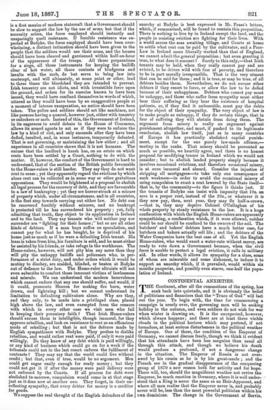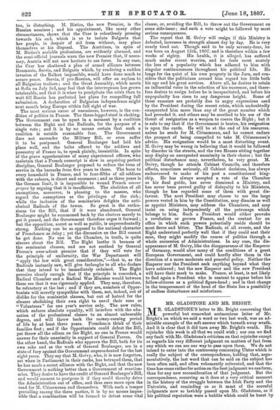CONTINENTAL ANXIETIES.
THE Continent, after all the commotions of the spring, has sunk back into quietude, and it is obviously the belief of politicians and financiers that the "Truce of God" will last out the year. To begin with, the time for commencing a campaign is nearly over, the governing men will be seeking holiday in the autumn, and even soldiers do not wish for war when winter is drawing on. It is the unexpected, however, which always happens ; and there are at least three visible clouds in the political horizon which may portend, if not tornadoes, at least serious disturbances in the political weather of Europe. One of these, the condition of the Emperor of Germany, we cannot discuss freely, though we think it evident that his attendants have been less sanguine than usual all through this attack, and though we believe his death would produce a profound, if not a dangerous change in the situation. The Emperor of Russia is not over- awed by his cousin as he is by his great-uncle ; and the French see in the gradual disappearance of the conquering group of 1870 a new reason both for activity and for hope. There will, too, should the magnificent weather not revive the Emperor, be much emotion in Germany, where it is well under- - stood that a Xing is never the same as an Heir-Apparent, and where all men realise that the Emperor never is, and probably never will be, less than the most powerful politician within his own dominions. The change in the Government of 8ervia,
too, is disturbing. M. Ristics, the new Premier, is the Russian nominee ; and his appointment, like many other circumstances, shows that the Czar is relentlessly pressing towards his end, which is so to isolate Bulgaria that her people, in despair of aid from without, may place themselves at his disposal. The Austrians, in spite of M. Ristics's amiable professions, are evidently alarmed, and the semi-official journals warn the new Premier that, if neces- sary, Austria will not now hesitate to use force. In any case, the Czar has shattered a plan of armed alliance between Roumania, Servia, and Bulgaria which, by rendering a sudden invasion of the Balkan impossible, would have done much to secure peace. Servia, if pro-Russian, will offer an asylum to all Bulgarian traitors ; and the Great Assembly, which meets at Sofia on July 3rd, may feel that the interregnum has grown intolerable, and that it is wiser to precipitate the crisis than to wait till Russia has perfected her plans for compelling full submission. A declaration of Bulgarian independence might next month bring Europe within full sight of war. The most serious cause of uneasiness, however, is the con- dition of politics in France. The three-legged stool is shaking. The Government can be upset in a moment by a coalition between the Right and the Radicals, for the purpose of a single vote ; and it is by no means certain that such a coalition is outside reasonable fear. The Government dare not surrender the Military Bill, or even suffer it to be postponed. General Boulanger had laid his plans well, and the bribe offered to the soldiers and peasantry of France is, to speak plainly, irresistible. In spite of the grave apprehensions of many experienced officers, who maintain that a French conscript is slow in acquiring perfect discipline, General Boulanger proposed to reduce the term of service in the barracks from five years to three. The boon to every household in France, and to four-fifths of all soldiers with the colours, is direct and enormous ; and as three years is the German limit, it is impossible to wound French amour propre by arguing that it is insufficient. The abolition of all exemptions, moreover, is pleasing to the masses, who regard the exemptions as the privileges of the rich ; while the inclusion of the seminarists delights the anti-
clerical Radicals of the towns. So great is the enthu- siasm for the Bill, that if it were abandoned, General Boulanger might be summoned back by the electors merely to get it passed, and the Government therefore urges it forward ; but the opposition, secret as well as public, is unprecedeutedly strong. Nothing can be so opposed to the national character of Frenchmen as delay ; yet the discussion on the Bill cannot be got done. No one in the Chamber, in truth, is quite sincere about the Bill. The Right loathe it because of the seminarist clauses, and are not soothed by General Ferron's over-adroit promise that if they will vote for the principle of uniformity, the War Department will " apply the law with great consideration,"—that is, as the Radicals instantly saw, will give furloughs to all who declare that they intend to be immediately ordained. The Right perceive clearly enough that if the principle is conceded, a Radical Chamber and a Radical War Minister would between them see that it was rigorously applied. They may, therefore, be refractory at the last ; and if they are, numbers of Oppor- tunists will secretly sympathise with them, not, indeed, out of dislike for the seminarist clauses, but out of hatred for the clauses abolishing their own right to enrol their sons as "Volunteers" for one year's service only. The new rules, which enforce absolute equality, will interfere with the edu- cation of the professional classes to an almost unbearable degree, and will throw back the money-earning period of life by at least three years. Frenchmsn think of their families first ; and if the Opportunists could defeat the Bill, yet throw all the odium on the Right, no one in France would answer for their unanimity in support of General Ferron. On the other hand, the Radicals who approve the Bill, both for its own sake and as the work of General Boulanger, are in a state of fury against the Government unprecedented for the last eight years. They say that M. Grevy, who, it is now forgotten, sat when in Parliament in their ranks, has betrayed them, that he has made a secret alliance with the Right, and that the new Government is nothing better than a Government of reaction- aries. They desire to have the credit of General Boulanger's Bill, and would consent to postpone it if they could thereby drive the Administration out of office, and thus once more open the road for M. Clemenceau and themselves. With such a temper prevailing among the three parties, it is by no means impos- sible that a combination will be formed to defeat some vital
clause, or, avoiding the Bill, to throw out the Government on some side-issue ; and such a vote might be followed by most serious consequences.
The report that M. Grevy will resign if this Ministry is defeated, increases in strength almost day by day. He is very nearly tired out. Though said to be only seventy-four, he was born on August 15th, 1807, and is therefore within a few weeks of eighty. His health, it is alleged, has suffered much under recent worries, and he feels most acutely the loss of a popularity which has adhered to him with singular continuousness throughout his political life. He longs for the quiet of his own property in the Jura, and con- siders that the politicians around him regard too little both his age and his great services. Above all, he desires to retain an influential voice in the selection of his successor, and there- fore desires to resign before he is incapacitated, and before his unpopularity has risen to any dangerous height. Some of these rumours are probably due to angry expressions used by the President daring the recent crisis, which undoubtedly exasperated him more than any of the great number which had preceded it, and others may be ascribed to his use of the threat of resignation as a weapon to coerce the Right ; but it is safe to say that if the Government is beaten, his resignation is upon the cards. He will be at the end of his resources, unless he sends for M. Clemencean, and he cannot endure the prospect of being compelled to take K Clemencean's advice. His resignation would be a most disturbing event. IL Grevy may be wrong in believing that it would be followed by disorder in the streets, and the two Houses sitting together may display an unexpected unanimity in their choice ; but the political disturbance may, nevertheless, be very great. M. Grevy, though he attends Cabinet Councils, and therefore affects, sometimes seriously, all Cabinet decisions, has always endeavoured to make of his post a constitutional king- ship. He has always accepted a vote of the Chamber as his final guide, has never dismissed a Ministry, and has never been proved guilty of disloyalty to his Ministers, though he has regarded some of them with great dis- favour. The next President may choose to use the large powers vested in him by the Constitution, may dismiss as well as appoint Ministers, may address the Chambers, and may insist on using independently all the patronage which belongs to him. Such a President would either provoke a revolution or govern France, and the contest for an office in which each powers potentially reside should be most fierce and bitter. The Radicals, at all events, and the Right understand perfectly well that if they could seat their man, they might modify the course of politics through a whole succession of Administrations. In any case, the dis- appearance of IL Grevy, like the disappearance of the Emperor of Germany, would alter many of the conditions of a great European Government, and could hardly alter them in the direction of a more moderate and peaceful policy. Neither the Emperor nor the President seek anything beyond what they have achieved ; but the new Emperor and the new President will have their mark to make. Francs, at least, is not likely to find again a President who is content to appear before his fellow-citizens as a political figure-head ; and in that change in the temperament of the head of the State lies a possibility of endless disturbance and misfortune.



































 Previous page
Previous page